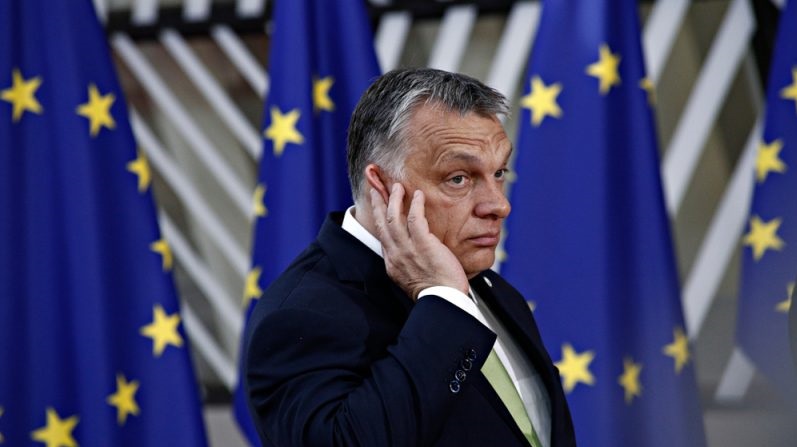
A new resolution that will be put to a vote by the European Parliament asks if Hungary should be allowed to take on the EU’s rotating presidency next July 2024 in an unprecedented move. The resolution, which is not legally binding but points the way to yet another significant political dispute between Brussels and Budapest, where Fidesz has ruled since 2010, has the support of the three main parties in the European Parliament such as the center right EPP, the liberal Renew Europe, and the Greens and Left groups (Fox, 2023).
The draft resolution stated that the parliament ‘questions how Hungary is able to fulfil this task credibly in 2024 in view of incompliance with EU law and the values enshrined in Article 2 Treaty of the European Union (TEU) as well as the principle of sincere cooperation’ (Michelot, 2019) (Zalan, 2023). Following that, it exhorts the governments of the EU to ‘find a proper solution as soon as possible’ and ‘reminds that Parliament could take appropriate measures if such a solution is not found’ (European parliament, 2023).
The promise that the European Parliament will try to prevent Hungary from taking over the six-month presidency of the Council of the European Union due to its illiberal drift, has stirred the waters in Brussels. Precisely, in July 2024, it would be when the possibilities of blocking Budapest in the use of its rotating presidency would arise, a fact that has no precedent in the European Union (Fox, 2023).
This institution has for years been the European institution most critical of Hungarian Prime Minister Viktor Orbán’s anti-European discourse and his departure from values such as judicial independence and respect for minorities. Therefore, it calls on the Council ‘to find a solution as soon as possible’ and recalls that Parliament itself ‘can take appropriate measures’ if such a solution is not found (Zornoza, 2023).
We ask ourselves, is there a legal basis for blocking a Presidency for infringements of EU law? The basic answer is no. Both Hungary and Poland, which will take over the presidency from Budapest in January 2025, have had proceedings open for years for the violation of fundamental European rights which, if concluded, could lead to the withdrawal of their voting rights from the Council (Lane Scheppele et al., 2020). However, these have never progressed far enough because they require the unanimity of all member states and historically Budapest and Warsaw have protected each other. While a potential attempt to change the presidency calendar so that Spain and Belgium which share a ‘trio’ with Hungary, extend their turns at the helm of the Council by three months each, only requires a qualified majority to be realized. This can be considered as a very thorny decision from a political point of view (Zornoza, 2023) (Vande, 2015).
Nevertheless, the Parliament, even with its internal differences on how to deal with Hungary, often gathers progressive majorities to condemn the situation of fundamental values in this country, and MEPs such as French Green Gwendoline Delbos-Corfield insisted Friday that ‘the Hungarian government has not yet presented credible reforms that would fix the serious situation of the rule of law’ (Zalan, 2022). However, this will be the first time that a member state subject to the Article 7 procedure will assume the rotating presidency of the Council. This situation raises serious concerns about the Hungarian government’s ability to lead the EU Council presidency and adhere to European values if Hungary cannot be considered a functioning democracy (Zornoza, 2023). However, nothing has been decided yet and this situation will evolve in the coming months.
References
• Zalan, E. (2023). MEPs to urge block on Hungary taking EU presidency in 2024. EU Observer. EU political. Retrieved from: https://euobserver.com/eu-political/157077
• Zalan, E. (2022). Hungary ‘no longer a full democracy’, MEPs set to declare. EUobserver. Retrieved from: https://euobserver.com/rule-of-law/156055
• European Parliament (2023). MOTION FOR A RESOLUTION on the breaches of the Rule of Law and fundamental rights in Hungary and frozen EU funds. Retrieved from: https://www.europarl.europa.eu/doceo/document/B-9-2023-0257_EN.html
• Fox, B. (2023). The Brief — A march to the Hexit. EURACTIV. Retrieved from: https://www.euractiv.com/section/politics/opinion/the-brief-a-march-to-the-hexit/
• Fox, B. (2023). Hungary ‘unfit’ to hold EU presidency, warn MEPs. EURACTIV. Retrieved from: https://www.euractiv.com/section/eu-institutions/news/hungary-unfit-to-hold-eu-presidency-warn-meps/
• Michelot, M (2019). The article 7 proceedings against Poland and Hungary: What concrete effects?. Notre Europe. Jacques Delors Institute. Retrieved from: https://institutdelors.eu/en/publications/__trashed/
• Zornoza, L. (2023). ¿Puede el Parlamento Europeo bloquear la presidencia húngara del Consejo de la UE? (Can the European Parliament block the Hungarian presidency of the EU Council?). Infobae. Retrieved from: https://www.infobae.com/america/agencias/2023/05/26/puede-el-parlamento-europeo-bloquear-la-presidencia-hungara-del-consejo-de-la-ue/
• Lane Scheppele, K. et al., (2020). EU Values Are Law, after All: Enforcing EU Values through Systemic Infringement Actions by the European Commission and the Member States of the European Union, Yearbook of European Law, Volume 39, Pages 3–121, https://doi.org/10.1093/yel/yeaa012
By The European Institute for International Law and International Relations.















